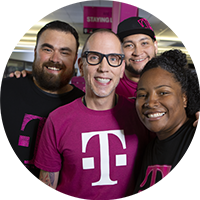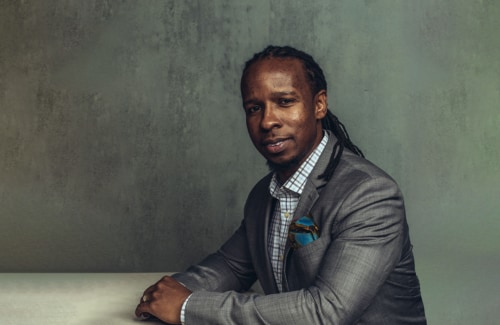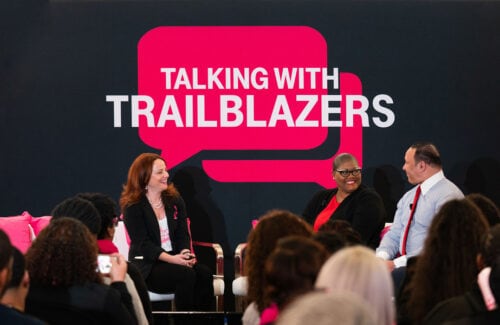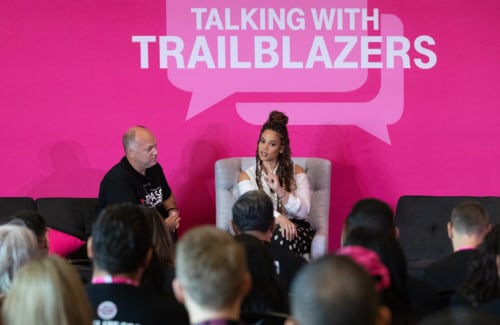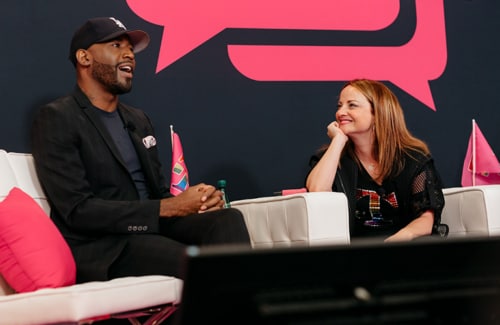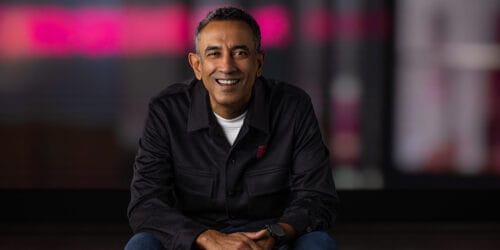More than 7,000 T-Mobile employees recently tuned in to a livestreamed conversation between EVP of Customer Care Callie Field and Professor Ibram X. Kendi, bestselling author of How to Be an Antiracist. The event was a part of T-Mobile’s ongoing Talking with Trailblazers series, organized by the Un-Carrier’s Multicultural Alliance in observance of Juneteenth, and it found the two discussing ways that all of us can take part in ending systemic racism.
In addition to authoring numerous award-winning books, the professor of history and international relations is also the director of the Boston University Center for Antiracist Research.
“You have some who argue that it’s the responsibility of people of color to fix racism, and you have others who argue it’s the responsibility of white people to fix racism,” Professor Kendi said during the talk. “I would argue that it’s the responsibility of people to fix racism. Historically, we’ve had people who have come together from different races who have used their expertise and their abilities to challenge racism. That’s what we need. It’s not the responsibility of any racial group, it’s the responsibility of us all.”
Here are other key takeaways that Professor Kendi offered during this timely and important Talking with Trailblazers event.
How to be an antiracist on an individual level…
“How is someone addicted to racism? Well, if you’ve been born and raised to understand the world and relate to people and policy and institutions through a racist prism, you can’t just turn that all off — that’s not the way the mind works. Realizing and admitting one’s racism is a huge step. Just as for someone who is addicted to a substance, it is a huge step to overcome the denial. And so if the heartbeat of racism is denial, then the heartbeat of antiracism is confession, admission, acknowledging. Because that opens the door to treatment. That opens the door to beginning to shed one’s self of the racist idea that one is nurtured in, that gives that person the opportunity to stop supporting racist policymakers and policies and begin supporting antiracist policymakers and policies. It’s a steady, everyday process trying to overcome an addiction.”
And on a company level.
“At the heart of my work is providing a vocabulary for people, whether that’s people in a community or people in a company, to not only be able to identify their own racism, but being able to identify the racism persisting within the company or even in the company sector. I think that one of the ways in which a company can facilitate that mission is to define terms. Maybe you replace the current diversity statement, or add to the diversity statement, and in that you would define what a racist idea is, what an antiracist idea is, what a racist and antiracist policy is — literally defining.
“Then you can create a mechanism for what happens when a person expresses a racist idea based on that definition. What’s the process? How should people respond to them? So that everyone has a collective understanding of what’s going to happen when, for example, someone states a racist idea when you’re in a meeting. Maybe the discussion is about recruiting more Black people, and someone says, ‘Well, those Black people are not qualified.’ What’s the process of responding to that person’s racist idea?
“I think that [response] can be systematized. A company is typically based on policies and processes, so you can create a process that everyone is committed to and everyone understands. The person who’s on the receiving end, who just said Black people are not qualified, they’ll see the company policy. That’s absolutely critical, because what oftentimes happens now is it’s individuals on individuals, as opposed to a person feeling they have the backing of the actual policy and the values of the company.”
“Microaggression” is not actually the right word for what people are experiencing.
“The way Black people and other groups that are subjected to microaggressions experience it is not as merely a small aggression. Their experience is more related to abuse. And so that’s why I call it racist abuse. And we should not think about these instances in isolation, because people don’t experience them in isolation.
“If I walk out of my home right now and I start walking down the street and an older white woman grabs her purse and crosses the street, and then I get to the next street and a police officer harasses me and says I fit the description [of a suspect], and then I walk into a store and I’m followed by a clerk, I’m not just thinking about each of these individual instances, I’m thinking about them in their aggregate. And I’m going to have an emotional response that is more indicative of somebody being abused than simply an aggression. And I think that’s why I like to call it racist abuse rather than microaggression.”
Empathy is key.
“I think one of the critical aspects of being antiracist is to step outside of yourself. I recently wrote an essay entitled “The American Nightmare,” which spoke to what it feels like to not only be subjected to the dangers of racism but [to also be] considered dangerous. And also what it feels like for a Black person who knows that George Floyd could have been them, who knows Breonna Taylor could have been them. And you have white people who refuse to step into their souls to empathize. That’s why I continuously ask people to step into these people’s souls, to really step into their bodies, to really understand what it means to be Black, because you’re not going to understand your advantages and privileges without that.”
How to be an antiracist as a colleague and friend.
“I think white people [need] to recognize that there are many Black people who are in pain and who are mourning, and who are grieving, and who are outraged. And so, it may not be the time to call, it may not be the time to pull them aside in the coffee room or to call them up and say, ‘Teach me about race!’ This may not be the time. And so instead of contacting your Black colleague who probably is not an expert on racism, and has their own expertise, it may be better for you to read up on the topic. And that then allows your Black colleagues to continue to grieve and feel their sort of pain.
“And I think simultaneously, it is stepping back and recognizing the humanity of people. When they suffer through traumatic situations, they’re going to feel it emotionally. And you should be more focused on their feelings and what they’re going through than your own feelings of shame or guilt or whatever. When your Black colleague calls you, or pulls you aside to listen, if they’re challenging you because they’re connecting about something that’s in the news with something that you did to them, be willing to admit it and say I’m sorry. Be willing to change. I mean, people’s feelings aren’t wrong. I suspect the Black folks who are your colleagues are not just thinking about what happened to George Floyd, they’re thinking about what happened to them. And people should recognize that.”
There’s reason for hope.
“There was a time in which people imagined that being able to walk around and talk on a cell phone to someone halfway around the world was impossible. There was a time in which that was completely inconceivable. But somebody imagined it being possible. Somebody believed in the possibility of change. You have to believe in the possibility of change in order to bring it about. And even if it seems completely daunting, even if it seems completely impossible, even if that world seems like it’s extremely far away, you have to believe in its possibility in order to bring it about.”
Stay tuned for more takeaways from T-Mobile’s Talking with Trailblazers series.
